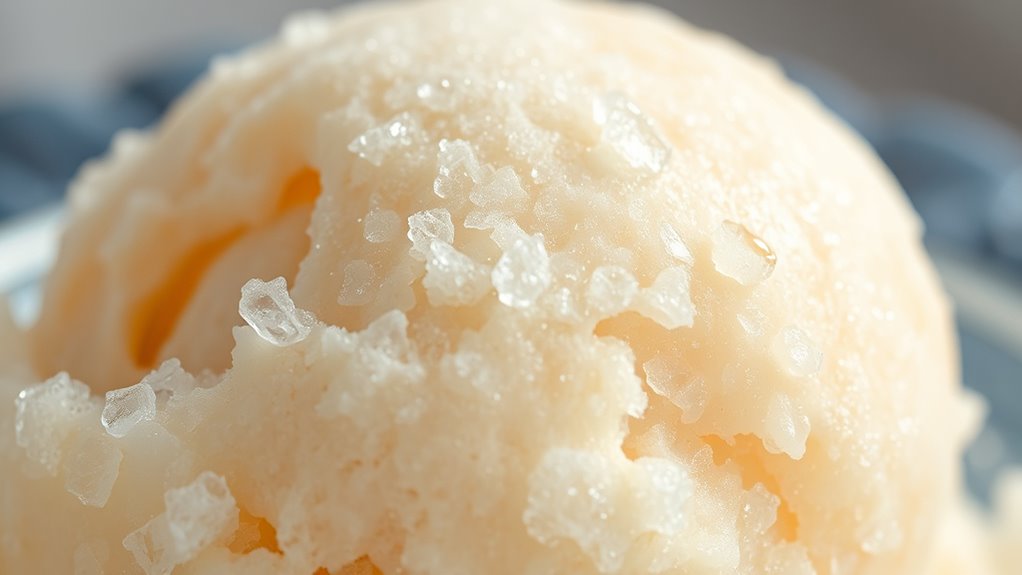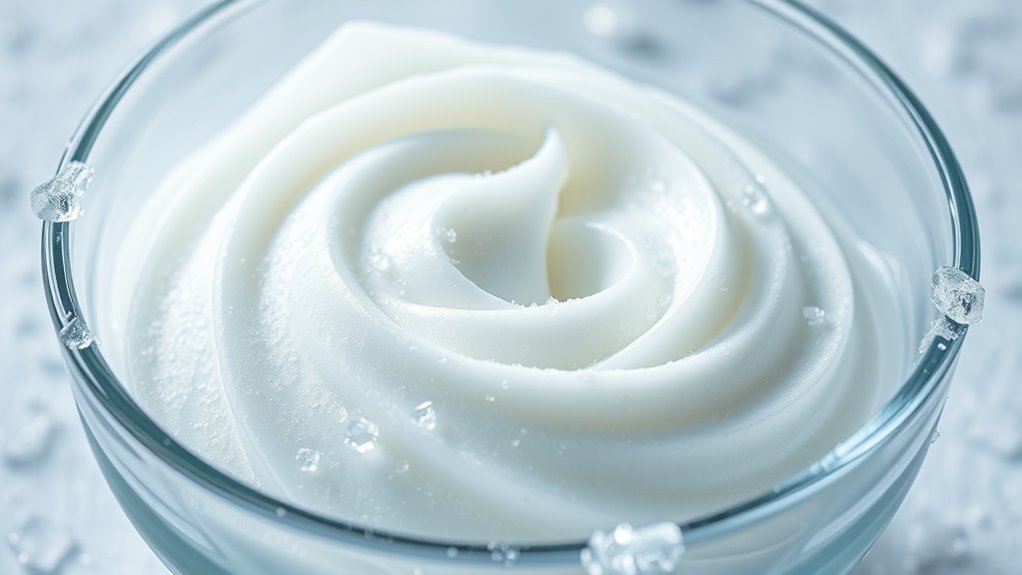Erythritol adds a natural sweetness to your frozen desserts while creating a cooling sensation that enhances your sensory experience. When you enjoy a treat with erythritol, it absorbs heat during melting, producing an icy, invigorating feel on your palate. This cooling effect improves texture, making low-sugar options feel indulgent and satisfying. If you want to discover how erythritol boosts flavor and texture even further, keep exploring.
Key Takeaways
- Erythritol absorbs heat during melting, creating a cooling sensation in frozen desserts.
- The cooling effect enhances the perception of freshness and indulgence.
- It amplifies the icy, invigorating sensation, improving overall sensory experience.
- The cooling sensation contributes to a richer, creamier mouthfeel.
- Erythritol’s cooling effect can mask aftertastes of other sweeteners, balancing flavor.

Have you ever wondered how frozen desserts can stay sweet without packing in sugar? The secret lies in ingredients like erythritol, which is a type of sugar alcohol that offers a unique way to achieve sweetness while reducing sugar content. Unlike traditional sugars, sugar alcohols such as erythritol provide sweetness with fewer calories and a lower glycemic response, making them popular choices in low-sugar or sugar-free treats. But beyond just sweetness, erythritol also plays a critical role in flavor enhancement, helping frozen desserts taste rich and satisfying without the need for excessive sugar.
One of the most interesting aspects of erythritol is its cooling effect. When you enjoy a scoop of sugar-free ice cream or sorbet containing erythritol, you may notice an icy, invigorating sensation on your palate. This cooling sensation occurs because erythritol absorbs heat during the melting process, creating a perceptible chill that enhances the sensory experience. This cooling effect isn’t just a side note; it’s an intentional benefit used by food scientists to improve the overall perception of frozen desserts. It can make the texture seem creamier and more indulgent, even when the dessert contains less sugar.
Because erythritol is a sugar alcohol, it interacts differently with your taste buds compared to regular sugar. It provides a sweet flavor that’s very similar to sugar, which means you don’t have to compromise on taste when cutting back on traditional sugars. Additionally, erythritol’s flavor enhancement properties help balance the frozen dessert’s overall profile. It can amplify other flavors—like fruit or chocolate—making them more vivid and appealing, even in low-sugar formulations. This synergy allows manufacturers to create desserts that are just as flavorful and satisfying as their sugared counterparts, but with fewer calories and less impact on blood sugar levels.
Furthermore, erythritol’s ability to provide sweetness without the added calories makes it a preferred choice for health-conscious consumers. It gives frozen desserts a natural, clean sweetness, and its cooling effect can help mask any slight aftertastes that some other sugar substitutes might introduce. This combination of benefits makes erythritol a versatile ingredient that not only maintains sweetness but also elevates the overall sensory experience of frozen desserts. It is also known for its high digestibility, which minimizes gastrointestinal discomfort compared to other sugar alcohols. So, when you indulge in a frozen treat made with erythritol, you’re experiencing a carefully crafted balance of flavor enhancement, cooling sensation, and health-friendly ingredients—all working together to satisfy your cravings without the guilt.
Frequently Asked Questions
Does Erythritol Cause Any Gastrointestinal Issues in Some People?
Yes, erythritol can cause gastrointestinal discomfort in some people, especially those with digestive sensitivity. You might experience symptoms like bloating, gas, or diarrhea after consuming it. These issues occur because erythritol is a sugar alcohol that isn’t fully absorbed in your gut, leading to fermentation. If you notice discomfort, it’s best to limit your intake or choose alternatives to avoid gastrointestinal issues.
How Does Erythritol Compare to Other Sugar Alcohols in Sweetness?
Imagine climbing a gentle hill—erythritol offers a sweetness level similar to sugar, making it feel familiar and balanced. Compared to other sugar alcohols, it has a mild aftertaste that fades quickly, unlike some that leave a lingering sweetness. You’ll find erythritol’s sweetness more natural, providing a satisfying taste without overpowering. It’s like tasting a fresh fruit—sweet, clean, and delightful—without the heavy aftertaste others might leave behind.
Can Erythritol Be Used in Hot Desserts Without Losing Its Properties?
You can use erythritol in hot desserts without losing its properties, as it has good heat stability. Unlike some sweeteners, erythritol maintains its sweetness and flavor retention when exposed to heat. This makes it suitable for baking or cooking, ensuring your desserts stay sweet and flavorful even after heating. Just be mindful that excessive heat might slightly alter its texture, but overall, erythritol performs well in hot preparations.
Is Erythritol Suitable for People With Specific Dietary Restrictions?
Erythritol is a great choice if you have specific dietary restrictions, as it’s low in calories and doesn’t spike blood sugar levels. You’ll be glad to know it’s generally allergen-free, making it suitable for many. However, always check product labels for potential allergen considerations, especially if you have sensitivities. Think of erythritol as a versatile ingredient that fits neatly into most dietary plans, helping you enjoy treats without worry.
What Is the Environmental Impact of Producing Erythritol?
You might be concerned about erythritol’s environmental impact. Its production generally involves sustainable sourcing of raw materials like corn or wheat, which helps reduce environmental strain. However, manufacturing emissions can vary depending on production methods, with some facilities generating more carbon footprint than others. Overall, choosing producers committed to eco-friendly practices can help minimize erythritol’s environmental impact, making it a more sustainable sweetener option.
Conclusion
Incorporating erythritol into your frozen desserts can deliver sweetness without the extra calories, all while enhancing that satisfying cooling effect. It’s a win-win for health-conscious treat lovers. Just remember, don’t judge a book by its cover—sometimes the best ingredients surprise you. With erythritol, you get more than just sweetness; you get a invigorating experience that keeps your desserts light and delightful. So, give it a try and enjoy the sweet ride!









